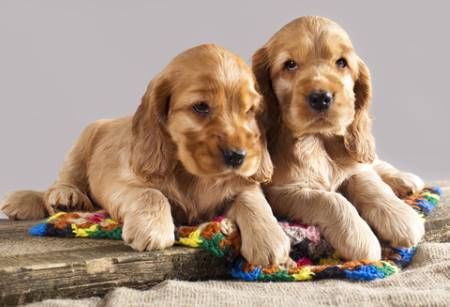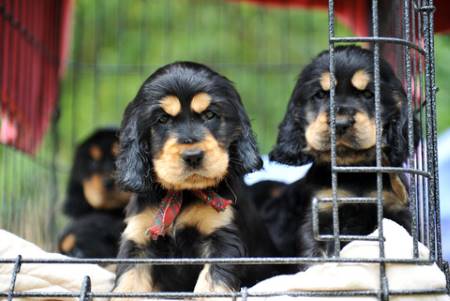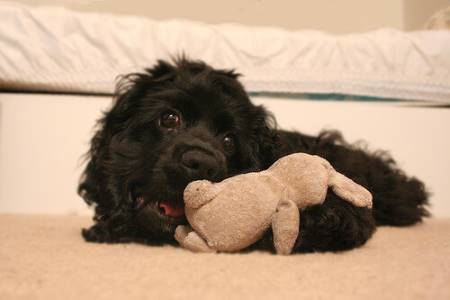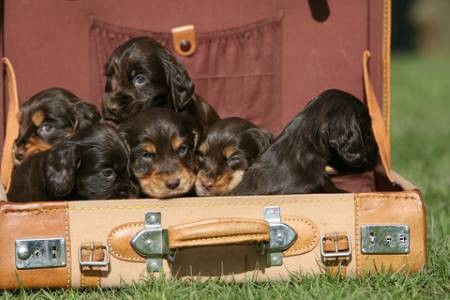- Home
- Getting A New Puppy
- Raising two puppies
Raising Two Puppies: 9 Essential Tips To Help You Get It Right!
Many make the mistake of believing raising two puppies at once would mean twice the fun and double the love.
Unfortunately, whilst it is possible, it's often fraught with difficulties. Raising two pups simultaneously in the same household is often a bad idea and could be a recipe for disaster.
Understand why, and if you're still genuinely determined to have two pups, here's how to survive the experience!
Raising Two Puppies Can Be Problematic!
Visitors often ask if raising two puppies in the same household is a good idea. My answer is always an emphatic NO, and the answer is still the same whether the puppies are from the same litter or not.
Please don't do it because you may live to regret it, especially if you've never previously owned a puppy!
 I'd like to pick two puppies out of this lineup, wouldn't you?
I'd like to pick two puppies out of this lineup, wouldn't you?Responsible cocker spaniel breeders will only sell one puppy from any litter to the same family and never allow two puppies to go to the same forever home.
There are many good reasons why raising two puppies is a mistake, and this page explores how problematic it can be and how to overcome those problems.
Why Raising Two Puppies is a Bad Idea
What follows is a list of reasons why raising two puppies together is inadvisable; however, if you are still intent on raising two puppies, here's how you can do it.
The Puppies May Bond With Each Other At Your Expense!
Young puppies raised together in the same household will invariably form a strong bond with each other. When this happens, there's a possibility that they'll fail to bond with their owner or any other member of the family.
Failing to bond with their owner is not a good situation and may lead to the pup developing an unhealthy disrespect for humans; this is when the trouble begins!
The Puppies May Have Separation Anxieties
When two puppies develop a bond, it will almost certainly lead to separation anxieties should they ever need to be apart for any length of time.
For example, if one puppy needs to spend a night at the vet's surgery, both puppies may become anxious and stressed, and almost certainly, they will cry, whine, howl or bark in the other's absence.
They May Be Challenging To Manage
Puppies like to play, and if they have a sibling to play with, all the better. Twice the fun for them!
However, puppies will be puppies; they don't know when to stop and when play gets out of hand, they can become challenging to manage, notably where they've failed to bond with their owner.
It May Lead To Behavioural Problems
Raising two dogs at once can also result in many behavioural problems; naughty and mischievous as puppies, leading to more serious behavioural problems as adult Cocker Spaniels.
A Dominant Puppy May Restrict Development of His Sibling's Personality
With two puppies in the household, there's always a danger that the more dominant of the two may shape or restrict the development of the other puppy's 'personality'.
The weaker of the two puppies may follow the lead of the more dominant puppy, picking up any naughty habits.
It's also possible that the dominant puppy will bully the weaker one.
Raising Two Puppies Is Time Consuming!
Caring for one new puppy can be very time consuming and can eat away your day, so imagine how busy you'd be with two!
A solid puppy care routine (feeding, toilet training, playtime, obedience training, socialization, sleeping, crate training etc.) can take at least two or three hours out of your day and more. You can easily double that for two puppies!
Raising Two Puppies Is Expensive!
This statement may sound obvious, but raising two puppies is expensive and will cost twice as much as owning only one. There will be no savings to be made by having two pups!
Just think about it. You'll have to finance two lots of vet fees, food, groomers, beds and blankets, crates, boarding kennels, training classes, etc.
I heartily recommend that before you commit to buying even one puppy, you do a costing exercise. You'll be surprised at how much it can cost for one dog, never mind two!
Training Two Puppies Is Challenging!
Unless you are an experienced dog trainer, training two puppies together will be almost impossible. Imagine trying to get puppy number one to sit nicely while puppy number two is rolling over his head or biting his tail!
It can be like trying to nail jelly to the wall; it just won't work!
Summary: Why Raising Two Puppies Is A Bad Idea!
Hopefully, the above has made you think twice about getting two puppies, and you're now having second thoughts.
However, if I've not managed to put you off and you still want more than one little bundle of fun, why not consider buying your second puppy when the first one is well-socialized and fully trained?
That way, you have a better chance of managing the second puppy, and with a bit of luck, your first well-trained puppy will teach the other some good manners.

Nine Essential Tips for Raising Two Puppies At The Same Time!
If you've already bought two puppies and you're struggling with them and looking for guidance, the recommendations set out below may help you to put a stop to their mischief and mould your puppies into well-behaved, individual, adult Cocker Spaniels.
 Hello!
Hello!Your objective will be to raise two individual, well-socialized, well-trained, and well-mannered Cocker Spaniels.
1. Keep Your Puppies Apart As Much As Possible
It's thought that where puppies are raised together, their development falls short; individual attention will allow each puppy to develop to his full potential.
So it's essential that the pups are kept apart for the first few months of their life.
It's also equally important to give both puppies lots of individual attention.
Failure to do either of the above could result in two unruly, mischievous, un-trainable puppies that may develop behavioural issues later in their adult life.
2. Keep Your Puppies In Two Separate Crates
I recommend you crate your puppies separately. I appreciate it can be expensive, but they must spend time away from each other to help avoid separation issues.
Place the crates next to each other first, then gradually move them apart until they're at separate ends of the room; if you can move the puppies into separate rooms, even better.
Your Cocker Spaniel pups will only rest and sleep in their crates, leaving plenty of time to be together and have supervised fun!
If you've not yet crated your puppies, you'll find plenty of helpful advice on crate training your puppy here.
3. Always Feed Two Puppies Separately
Feeding your puppies separately, preferably in different rooms, will help to avoid problems with food aggression.
 This is my favourite toy rabbit!
This is my favourite toy rabbit!Feeding your puppies separately, preferably in different rooms, will help avoid food aggression problems.
For example, if both puppies feed side by side and one puppy finishes before the other, he may try to steal food from his sibling.
If this happens regularly, the other puppy will begin resource guarding and growl, snarl, snap, or bite if he believes his food is about to be taken from him.
For obvious reasons, resource guarding can become a serious problem, particularly if it's allowed to develop into adulthood. If that were the case, you would need to address it immediately.
Happily, dog food aggression may never arise if the puppies have their meals apart.
4. Socialize The Puppies Separately
Effective and timely socialization is essential if your puppies are to grow up to be contented and happy Spaniels.
The puppies must have their own individual socialization time to allow each puppy to concentrate on you and the socialization in hand rather than on each other.
If each puppy isn't socialized correctly, they may become easily frightened and confused by the simplest of situations or noises and become very nervous about their environment.
This 'fear' of most things around them can result in behavioural and aggression issues later in life.
Socializing your puppy is essential to their development, don't ignore it!
5. Train Your Puppies Separately
Dogs learn from each other; bad behaviour as well as good behaviour, and unless you're an expert dog trainer you'll more than likely end up with two very mischievous puppies who aren't in the slightest bit interested in what you're trying to teach them!
It will be better for all concerned if puppy obedience training is given to each pup separately, but before you do, I recommend you read my advice on how to train a puppy to give you a few tips first.
6. Play With Each Puppy Separately
Of course your puppies should be allowed to play together, but keep an eye on them and separate them if play gets too rough.
Spend some time playing with each puppy individually to help them learn that you're fun to be around and for them to want to be with you (rather than always with each other).
Once you have their attention in this way and they've bonded with you, there's a good chance that they'll want to do as you ask. Result!
7. Exercise And Walk Your Puppies, Individually
Exercise and walk your puppies on their own, but also walk them together, as a pack.
Walking
your puppies separately will make teaching them to walk nicely on the
lead much easier and will also help each puppy to get used to his
immediate environment without the distraction and/or intimidation of his sibling.
8. Take Your Puppies To The Vets Separately
When
it's time to take your puppies to see their vet, for example, for their
vaccinations or regular check ups, take them separately.
I
appreciate it may be more convenient to take both at the same time, but
what we're trying to do here is to treat each puppy as an individual and
not part of a whole.
9. Allow A Natural Hierarchy To Develop
As you interact with your puppies, monitor their behaviour to see if a natural hierarchy develops between the two puppies.
 Cute puppies sitting in a leather case!
Cute puppies sitting in a leather case!It's essential that you allow a hierarchy to develop, and it's important to respect that hierarchy.
Step in to referee only when it's absolutely necessary, for example, when one puppy is being mercilessly bullied by the other or play is getting too rough.
Having said that, regardless of each puppy's status in the pack, both should view and accept you as their alpha dog!
If you watch your puppies' behaviour when they're alone and playing together, you'll be surprised at how differently they behave when they're apart.
When two puppies are raised together, the dominant puppy will try to 'rule the roost' and may attempt to intimidate or bully the subservient puppy.
Their own 'true' personality is likely to shine through when they're apart.
Raising Two Puppies: Summary
I can't emphasize enough how important it is to separate the two puppies.
The separation will allow each pup to learn and develop at his own pace and for each personality to emerge naturally.
You won't need to keep your puppies apart forever, perhaps only for the first 8 - 12 months, just enough time to allow them to become well-trained, well-behaved, and thoroughly socialized adults with a healthy respect for their human pack.
If you decide to get two puppies, I hope this helps, and I wish you the very best of luck - enjoy them!
Photo credits for Raising Two Puppies:
1. Cynoclub at http://www.dreamstime.com/stock-image-puppies-english-cocker-image16956541
2. Liliya Kulianion at http://www.dreamstime.com/stock-photo-english-cocker-spaniel-puppy-image22874290
3. Cynoclub at http://www.dreamstime.com/royalty-free-stock-image-puppies-cockers-spaniel-image10324386
4. Odenosuke at http://www.flickr.com/photos/yoko69/502415885/
5. Juliane Meyer at http://www.dreamstime.com/stock-images-six-english-cocker-spaniel-puppies-suitcase-image8171274


